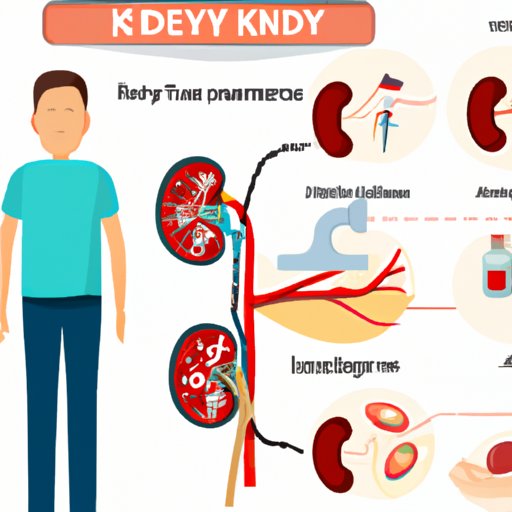
Introduction
In this article, we will explore how to recognize the symptoms of kidney disease, understand the risk factors and diagnostic tests for kidney disease, manage its symptoms, navigate the healthcare system, prevent its onset, and much more. Whether you are a patient, caregiver, or just someone who wants to learn more about kidney health, this article is for you.
Symptoms of Kidney Disease: Recognizing the Warning Signs
The kidneys are responsible for filtering waste products and excess fluids from the blood, and they play a crucial role in maintaining overall health. When they start to fail, waste products and fluids can build up in the body, leading to a range of symptoms and health problems.
Some of the most common symptoms of kidney disease include:
- Fatigue and weakness
- Swelling in the ankles, feet, or hands
- Changes in urination frequency, color, or appearance
- Blood in the urine
- High blood pressure
- Loss of appetite and nausea
If you experience any of these symptoms, it is important to see a doctor. They can perform diagnostic tests, such as blood and urine tests, to determine if you have kidney disease. Early detection and treatment can help prevent further damage to the kidneys and improve your overall health.
Understanding the Risk Factors for Kidney Disease and How to Get Tested
There are several risk factors for kidney disease, including:
- Age over 60
- Family history of kidney disease
- Diabetes
- High blood pressure
- Heart disease
- Obesity
If you have any of these risk factors, it is important to get tested regularly for kidney disease. Your doctor may recommend diagnostic tests, such as blood and urine tests, imaging studies, or a kidney biopsy, to determine if you have kidney disease.
If you are diagnosed with kidney disease, it is important to talk to your doctor about your treatment options and how to manage your symptoms. There are several treatment options available, including medications, lifestyle changes, and dialysis or kidney transplantation.
Living with Kidney Disease: Tips for Managing Your Symptoms and Staying Healthy
Living with kidney disease can be challenging, both physically and emotionally. It can impact daily life, work, and relationships. However, there are several things you can do to manage your symptoms and stay healthy.
Some tips for managing kidney disease include:
- Following a renal diet
- Staying active with regular exercise
- Taking prescribed medications regularly
- Managing stress through relaxation techniques, such as meditation or yoga
- Connecting with support groups or counseling services to address the emotional impact of kidney disease
What You Need to Know About Kidney Disease: A Comprehensive Guide for Patients and Caregivers
Kidney disease comes in several types, and each has its own set of causes, symptoms, and treatment options. Some types of kidney disease include:
- Acute kidney injury
- Chronic kidney disease
- Polycystic kidney disease
- Glomerulonephritis
- Nephrotic syndrome
In addition to these types of kidney disease, kidney failure is a common complication that may require kidney replacement therapy, such as dialysis or transplantation.
If you or a loved one is facing kidney disease, it is important to learn as much as possible about the disease, its treatment options, and how to manage its symptoms. There are several resources available, including patient education materials, support groups, and healthcare providers who specialize in kidney disease.
The Link Between Kidney Disease and Other Chronic Conditions: Diabetes, Hypertension, and More
Kidney disease is often linked to other chronic conditions, such as diabetes, high blood pressure, and cardiovascular disease. These conditions can contribute to the development of kidney disease and can make it more difficult to manage its symptoms.
Managing these conditions is crucial to preventing kidney disease and slowing its progression. Treatment options may include lifestyle changes, such as diet and exercise, and medications to manage blood sugar and blood pressure levels.
Preventing Kidney Disease: Lifestyle Changes and Treatment Options
Preventing kidney disease is an important part of maintaining overall health. Lifestyle changes, such as maintaining a healthy weight, quitting smoking, and managing stress, can help prevent kidney disease or slow its progression.
If you have risk factors for kidney disease, such as diabetes or high blood pressure, it is important to work with your healthcare provider to manage these conditions and prevent kidney damage.
In some cases, medical treatments may be necessary to prevent or reverse kidney damage. These may include medications to manage blood pressure or cholesterol levels, or surgery to remove blockages in the urinary tract.
Q&A: Experts Answer Your Questions About Kidney Disease, Its Causes, and Treatment Options
Here are some common questions about kidney disease that may be helpful for patients and caregivers:
- What causes kidney disease?
- What are the symptoms of kidney disease?
- How is kidney disease diagnosed?
- What are the treatment options for kidney disease?
- What is dialysis, and how does it work?
- What is kidney transplantation, and how does it work?
- How can I manage the symptoms of kidney disease?
- What lifestyle changes can I make to prevent kidney disease?
- Where can I find support for kidney disease?
If you have additional questions or concerns about kidney disease, talk to your healthcare provider or connect with a patient advocacy group.
Conclusion
Kidney disease is a serious medical condition that can have a significant impact on your health and quality of life. However, with early detection, proper treatment, and lifestyle changes, it is possible to prevent kidney damage and manage its symptoms. By learning more about kidney health and taking action to protect your kidneys, you can improve your overall health and wellbeing.
Remember to stay informed, stay healthy, and seek support when you need it.




